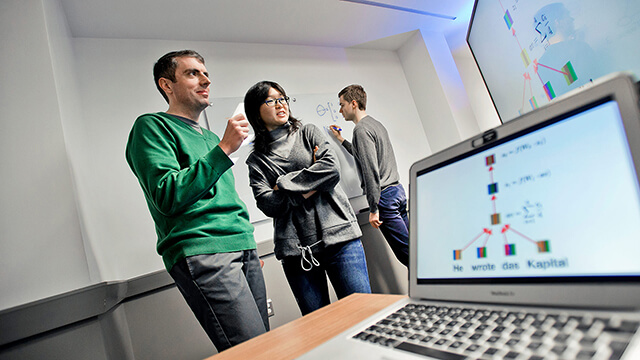- September 26, 2018
- By Sala Levin ’10
Trivia has played no trivial part in the life of computer science Associate Professor Jordan Boyd-Graber: He met his wife playing on the quiz bowl team of the California Institute of Technology, he serves as the academic adviser for the University of Maryland’s quiz bowl team, and tonight he makes his debut on the ultimate answer-and-question showdown: “Jeopardy!”
Part of what Boyd-Graber thinks made his third time trying out for the game show a success is QANTA, an artificial intelligence question-answer system he’s been developing at UMD since 2012. He suspects producers’ ears perked up when he talked about QANTA during his audition.
“I was less good at talking about myself and making myself seem interesting,” Boyd-Graber said of past tryouts. “Maybe my social skills have improved slightly.”
Boyd-Graber describes the “Jeopardy!” experience as equal parts nerves and excitement. “You’re in a pool [of contestants] waiting to be called—it’s not like you can sit back and enjoy watching the show,” he said. “Until you get called up, it’s very nerve-wracking, but it was still a lot of fun.”
(Full disclosure: The writer of this piece is also a “Jeopardy!” alum and can confirm that watching other contestants fail to identify which Balkan country the film directors Cristian Mungiu and Cristi Puiu are from can make one nervous.) (It’s Romania.)
After watching IBM’s artificial intelligence system known as Watson beat “Jeopardy!” greats Ken Jennings and Brad Rutter in 2011, Boyd-Graber got the idea to merge his professional and personal interests. “I didn’t realize you could do this as research,” he said. “I’d always kept those sorts of things completely separate in my life.”
Since then, Boyd-Graber—first working with Mohit Iyyer M.S. ’14, Ph.D. ’17—has been developing QANTA (which originally stood for Question Answering Neural Network with Trans-Sentential Averaging, but now stands for the comparatively breezy Question Answering is Not a Trivial Activity) to be able to beat quiz bowl competitors at their own game.
So why does he think quiz bowl—in which two teams face off on questions about literature, history, geography, science and more—makes for a better human-AI competition than “Jeopardy!”? In a quiz bowl game, contestants can buzz in as the question is being read whenever they think they know the answer; in “Jeopardy!,” contestants must wait for host Alex Trebek to finish reading the clue, and are then signaled when it’s time to buzz in with a lighting cue.
“In the trivia community, quiz bowl is viewed as a purer form of competition than ‘Jeopardy!,’” said Boyd-Graber. “’Jeopardy!’ has a different set of skills, including this reflex of when to buzz or not.”
QANTA works partly by studying tens of thousands of previously asked quiz bowl questions to learn which words are correlated between questions and answers. An example: The 19th-century pianist and composer Ignaz Pleyel is often discussed in conjunction with composer Johannes Brahms; QANTA can recognize the words “Ignaz Pleyel” in a question and knows that Brahms is likely the answer.
Computers “are not ‘smart’ in the same way as humans,” said Boyd-Graber. “They’re just good memorizers.” QANTA doesn’t know who Ignaz Pleyel is, so replacing his name with the words “a 19th-century pianist and composer” would render QANTA unable to answer the question. Eric Wallace ’19 is working with Boyd-Graber to better understand what stumps computers and makes human comprehension unique.
Boyd-Graber has taken QANTA on the road to quiz bowl tournaments a handful of times, once even besting 74-time “Jeopardy!” champion Jennings.
And is Boyd-Graber on his way to making “Jeopardy!” history himself? That’s one question he couldn’t answer.
On Dec. 15, UMD will host a quiz bowl competition between people and computers. Learn more here. Learn more about building your own question answering system and writing questions to stump a computer, or test your own trivia skills here.
